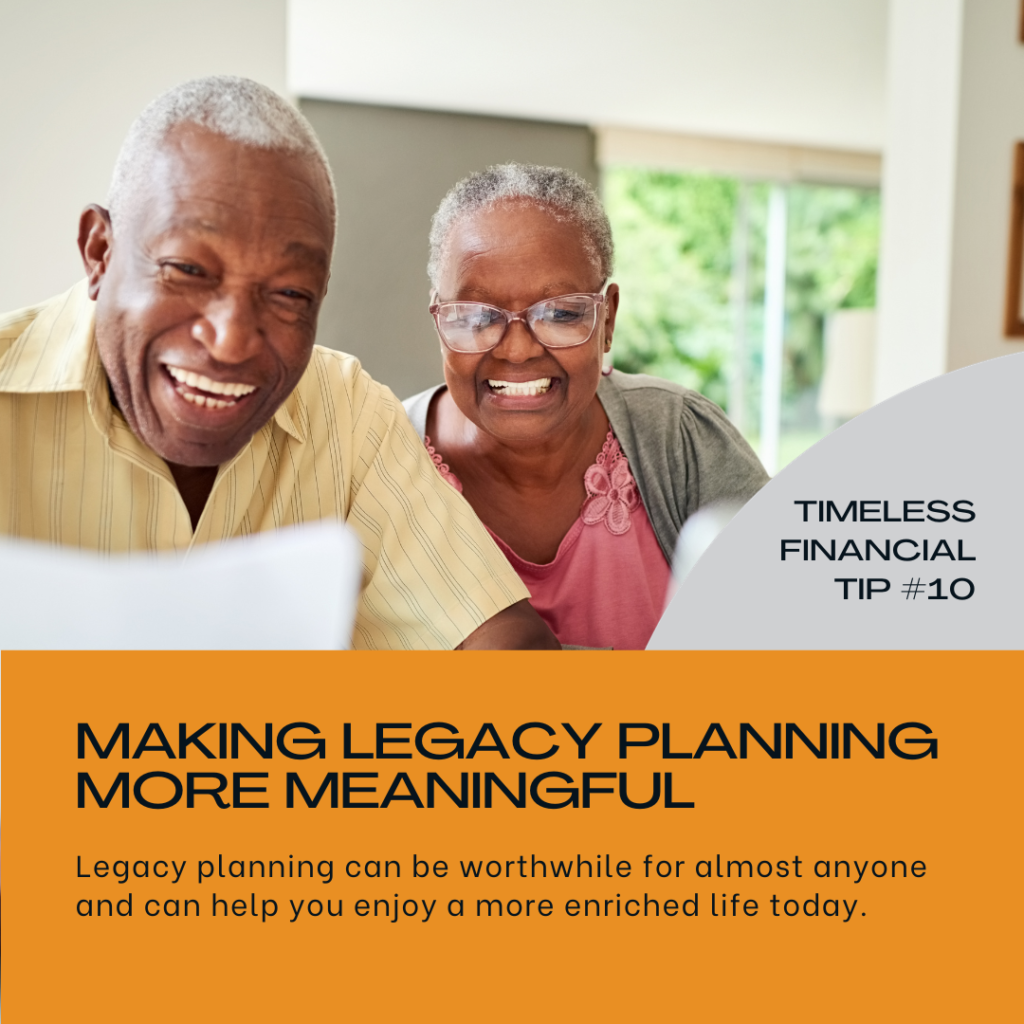By Steve Lowrie, CFA
Special to Financial Independence Hub
Let’s face it: When families list their favorite financial planning projects, legacy planning rarely makes the cut. It may feel as if you’re putting the emphasis exclusively on death and taxes, rather than your lifetime pursuits such as building a career, pursuing your personal interests, stewarding your kids into adulthood, and retiring in style.
Then again, I believe the term “legacy planning” is misleading to begin with. It sounds so dry and formal — as if it’s only for uber-rich, multigenerational dynasties, or the tail end of your lifespan.
No wonder most people put off planning for it.
In reality, legacy planning can be worthwhile for almost anyone. And it’s not just for later in life; key aspects of it can help you enjoy a more enriched life today. In today’s Timeless Tip, we’ll cover the possibilities.
What is Legacy Planning?
Instead of treating legacy planning as a tedious, end-of-life chore, I like to think of it as being more like a bonus round of lifestyle planning across four core quests:
- Family Ties: Legacy planning helps you keep more of your wealth in the family. Importantly, it lets you define who your family is, in a world where multiple marriages and blended families may more often be the norm than an exception to the rule.
- You or your Heirs: Legacy planning can also be defined by what it is not. If your top priority is having enough to enjoy your retirement in style, your legacy planning will differ from someone who dreams of leaving the largest possible inheritance to their heirs.
- Charitable Giving: Legacy planning also helps you chart out how and when you’d like to support your causes and charities of interest. Hint: You don’t have to wait until you’re gone to leave a legacy.
- Tax Reduction: Even if you’re fine with letting inheritance laws guide how your estate will be distributed, most of us would prefer a tax-efficient transfer. Legacy planning strategies abound here.
How do you define “Family”?
First, let’s address the piece most of us associate with legacy planning: Who gets what stuff after you’re gone? If your estate seems perfectly straightforward, you may be tempted to just let your heirs sort it out. Unfortunately, this can leave you and your loved ones uneasy — not just moving forward, but right now.
Unintended Consequences: Check your provincial inheritance laws, and you may be surprised by what will happen to your assets if you die intestate (without a will). Your preferences may differ dramatically from the government’s.
Unresolved Heirlooms: Resolving which loved ones are to receive which treasured heirlooms and other portions of your wealth, can bring you and your family more peace — today, and moving forward.
The Angst of Uncertainty: Most of us also feel better knowing we’ve done what we can to spare our heirs the pain of having to untangle an unplanned estate at the same time they are grieving a profound loss.
The logistics of estate planning need not be extensive. They can range from essential to more advanced:
Wills: A basic will might suffice if you simply want to ensure particular people directly inherit particular pieces or portions of your estate, as permitted by law — especially when your preferences differ from provincial law.
Trusts and Foundations: You may want to up the ante with targeted trusts to cover additional nuances in your life. For example, trusts can provide for underage heirs, an heir with special needs, or other complexities, such as if your family owns a business in which some, but not all family members are involved. Private foundations come into play if you are interested in increasing the scope of your multigenerational charitable giving.
Insurance: Life insurance is also an often-overlooked tool for providing gap funding to cover taxable wealth transfers, especially when family businesses are involved.
Bottom line, making plans today for your wealth transfer to happen with minimal muss, fuss, costs, and complications can free you to better enjoy your assets throughout your life.
Spending or Preserving?
As we covered in “Retiring Reliably, Leaving a Legacy or Balancing Both?, ” another key question is: Do you want to earmark excess wealth for your optimal retirement, an optimal legacy, or a balance of both? Different lifestyles call for different legacy plans.
You may not think of investment management as part of traditional legacy planning. But you’ll be better at both if you combine forces. For example, if you want to emphasize leaving a legacy, your investment portfolio’s average expected return should exceed your withdrawal rate, so inflation doesn’t eat away at the balance. This usually means keeping more of your investments working in the markets, while also arranging for a way to take out cash on a regular, tax-efficient basis.
For emphasizing retirement income, you might prefer an investment portfolio that offers more dependable outcomes … lower expected returns, but less risk of falling short. And, of course, as we covered in “Tax Strategies to Boost Your Financial Savings,” tax-efficiency remains just as important here as well.
There are no wrong answers. But it helps you to decide which answers are right for you.
Giving and Receiving
Are you charitably inclined? Interested in gifting to loved ones during your lifetime? Some of both? If so, you may be able to transform your legacy planning into something of more immediate value for all concerned.
As we described in “Accelerating Your Legacy Planning by Gifting in Advance,” charitable giving while you’re alive can offer solid tax-saving benefits to you and your eventual estate. In particular, it can be a powerful tool for business owners and similar professionals who are approaching retirement and facing high-tax events, such as selling their business, or exercising highly appreciated stock options.
As importantly, it can be emotionally rewarding. You may derive great pleasure from donating portions of your “legacy” while you’re still around to appreciate the results.
You may also want to share excess wealth with your kids, grandkids, or other important people in your life. For example, instead of leaving your children or grandchildren $1 million to inherit later, consider giving them $10,000 annually for a decade to help them right now as they fund their first home, pay for higher education, travel together as a family, and so on.
This form of gifting doesn’t offer as many tax benefits as charitable giving. But there are still tax angles to consider. For example, if you have excess wealth in the form of highly appreciated assets, you may (or may not!) prefer to sell some, pay the taxes, and give the after-tax proceeds to your kids now, free and clear of the taxable impact that might otherwise occur at inheritance.
With or without tax benefits, the excitement of watching a loved one’s face light up upon receipt can be incredibly heartwarming. Or, if a relatively modest gift turns into a disappointment, this too can inform you about your future priorities—before it’s too late to do anything about it.
About those Taxes
One more observation about taxes. Suppose you’ve done well for yourself. You’ve got more than you need to fund your own lifestyle and are facing an approximate $1 million tax bill on your estate. The next logical question is: Do you want your estate to eventually pay that $1 million tax bill? Or would you rather create a strategy to redirect the excess to charity, thus lowering the taxes owed in roughly equal measure?
Put another way, would you rather give more of your hard-earned money to your favorite causes, or to the government? A dose of legacy planning, combined with structures such as Donor-Advised Funds, can help you choose between these two possibilities. I know which one I would pick.
This circles us back to what may be my biggest takeaway on legacy planning:
You don’t have to wait until you’re dead to start fulfilling your desired legacy.
Why not plan and implement strategies for sharing some of your excess capital while you’re still around? You may be able to score potential tax savings, shore up your own financial well-being, and/or boost your charitable giving. As importantly, it can be incredibly rewarding to witness the results of your generosity. Before you know it, you may even find legacy planning toward the top rather than the bottom of your planning list.
Reach out to us if we help you with your legacy planning.
 Steve Lowrie holds the CFA designation and has 25 years of experience dealing with individual investors. Before creating Lowrie Financial in 2009, he worked at various Bay Street brokerage firms both as an advisor and in management. “I help investors ignore the Wall and Bay Street hype and hysteria, and focus on what’s best for themselves.” This blog originally appeared on his site on Nov. 6, 2023 and is republished here with permission.
Steve Lowrie holds the CFA designation and has 25 years of experience dealing with individual investors. Before creating Lowrie Financial in 2009, he worked at various Bay Street brokerage firms both as an advisor and in management. “I help investors ignore the Wall and Bay Street hype and hysteria, and focus on what’s best for themselves.” This blog originally appeared on his site on Nov. 6, 2023 and is republished here with permission.



